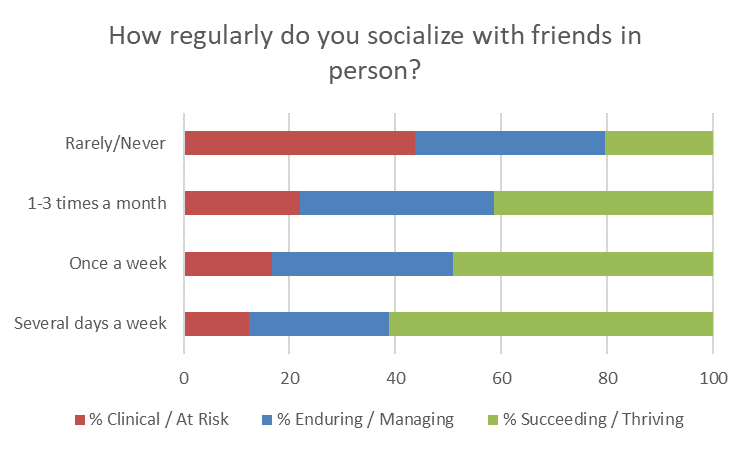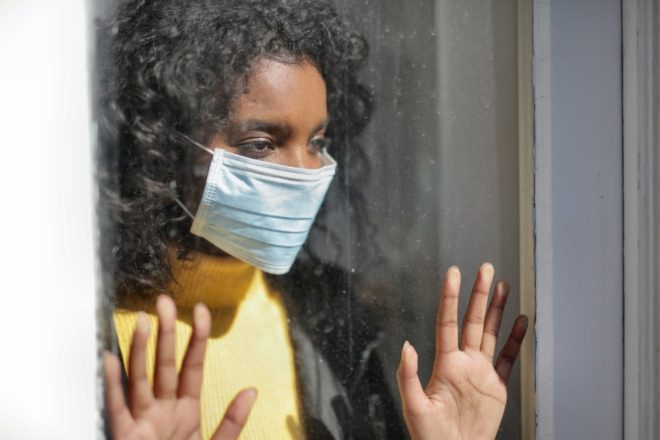The Mental Health Million Project is showing us the importance of face to face socialization on wellbeing. Rethinking the way we socialize during the pandemic is critical to preventing the long term health impact of social isolation and loneliness.
Families and communities across the globe continue to suffer from the devastating impact of COVID-19. As of present, there are over 6.6 million cases of COVID in the United States, and over 200,000 people have died. As well as suffering from the acute symptoms, some survivors are also experiencing long-term, lingering effects of the disease, such as dizziness, shortness of breath, and difficulty concentrating.
For months, countries around the world have been ordering quarantines and implementing social distancing rules. From a physical health perspective, these new rules are critical to slow the spread of the virus. However, these strategies are not without consequences. COVID-19 is also taking a severe emotional toll on people, which can lead to health problems down the line. Within the first few months of the pandemic, rates of emotional distress tripled, and loneliness among Americans increased by 20-30%. Older adults, people of color, those with low income, and those living in congregate care settings are disproportionately affected by loneliness. Unfortunately, they are the same groups that are high-risk for COVID-19.
Without regular contact with friends and loved ones, that is, face to face socialization, people are beginning to experience the physical and emotional effects of social isolation. To address these effects, we must consider two key questions:
- What do we already know about social isolation and health outcomes?
- How can we address social isolation moving forward while also curbing the spread of the virus?
Social Isolation and Health Outcomes
Social interaction is a biological need in humans. It is as essential as eating and drinking water for survival. Without regular social interaction, people’s physical and emotional health is at risk in the short-term and long-term. Studies of people who have experienced long-term isolation, such as prisoners, astronauts, and Antarctic researchers, show that prolonged periods of isolation can negatively impact a person’s cardiovascular health. How does this happen?
When we are with people that we trust, we feel safer, and our bodies relax. When we are isolated, though, we feel like we could be in danger. Feeling unsafe can make the brain go into a “flight or fight” response. If a person is in this hypervigilant state for long periods of time, high blood pressure and increased stress hormones can lead to problems with heart health in the future.
According to the American Psychological Association, feeling isolated can also impact a person’s immune system. Researchers found that lonely people’s white blood cells showed “an increased expression of genes involved in inflammation” and a decrease in genes affecting the body’s anti-viral response. Weakened immune systems will put people at higher risk for COVID-19 and other airborne diseases.
Finally, social isolation can also lead to a series of other problems, including depression and sleep issues. As an extreme example, NASA reports that despite extensive training and preparation, their astronauts often experience declines in their mood, morale, and ability to interact with others as the mission progresses. Other studies have found that prolonged isolation can lead to behavioral problems, including substance abuse, violence against others, or self-harm.
Sapien Labs’ Mental Health Million project asks how frequently people socialize face-to-face with others (considering their pre-pandemic habits) to see how how it relates to wellbeing. The current findings reveal that people who are Succeeding or Thriving in life are more likely to see their friends at least once a week compared to those with lower mental wellbeing scores. Conversely, people who are Distressed or Struggling (previously Clinical or At risk) are more likely to rarely or never spend time socializing compared to those with higher mental wellbeing scores. As the country makes decisions about supporting overall health during and after the pandemic, we cannot ignore that some social interaction is necessary to maintain mental health and wellness, face to face socialization is highly important.

Possible Interventions
For individuals struggling with social isolation, cognitive behavioral therapy (CBT) is often an effective intervention. Journaling can also help individuals sort through the emotional impact of isolation. In fact, NASA recommends journaling for their astronauts as a way to express their emotions during missions. And while it may not be the same as having face time, individuals should also try to maintain relationships online, through phone calls, or even texting to strengthen their social self. While we don’t know if screen time can fulfill our biological need for connection, at the moment, it’s better than no connection at all.
From a public policy perspective, a recent article from Health Affairs suggests that public policy changes in any sector can influence the amount and quality of social interaction. As we move forward, policymakers must design creative policy solutions that safely promote social connection while also limiting community spread. Evaluations of public policies should also include social outcomes in the future to show their effects on social connectedness.

